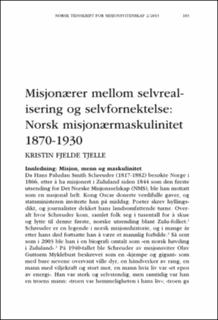| dc.contributor.author | Tjelle, Kristin Fjelde | |
| dc.date.accessioned | 2020-06-03T12:53:11Z | |
| dc.date.available | 2020-06-03T12:53:11Z | |
| dc.date.created | 2014-03-05T13:10:17Z | |
| dc.date.issued | 2013 | |
| dc.identifier.citation | Norsk tidsskrift for misjonsvitenskap. 2013, 101 (2), 103-121. | en_US |
| dc.identifier.issn | 1504-6605 | |
| dc.identifier.uri | https://hdl.handle.net/11250/2656402 | |
| dc.description.abstract | This article explores the construction and changing nature of masculinity amongst Lutheran Norwegian missionaries in Natal and Zululand (present day KwaZulu-Natal, South Africa) between 1870 and 1930. Presupposing masculinity to be a cluster of cultural ideas and social practices that change over time (history) and space (culture), and not a stable entity with a natural, inherent and given meaning, the article argues that ideal missionary masculinity in the Norwegian missionary movement was the result of a complex dialogue between ideas of modern male “self-making” associated with the late nineteenth century, and the Christian ideal of self-denial. | en_US |
| dc.language.iso | nob | en_US |
| dc.publisher | Egede instituttet | en_US |
| dc.subject | misjonærer | en_US |
| dc.subject | maskulinitet | en_US |
| dc.subject | identitet | en_US |
| dc.title | Misjonærer mellom selvrealisering og selvfornektelse: Norsk misjonærmaskulinitet 1870-1930 | en_US |
| dc.type | Peer reviewed | en_US |
| dc.type | Journal article | en_US |
| dc.description.version | publishedVersion | en_US |
| dc.rights.holder | Open Access | en_US |
| dc.source.pagenumber | 103-121 | en_US |
| dc.source.volume | 101 | en_US |
| dc.source.journal | Norsk tidsskrift for misjonsvitenskap | en_US |
| dc.source.issue | 2 | en_US |
| dc.identifier.cristin | 1120312 | |
| cristin.ispublished | true | |
| cristin.fulltext | original | |
| cristin.qualitycode | 1 | |
